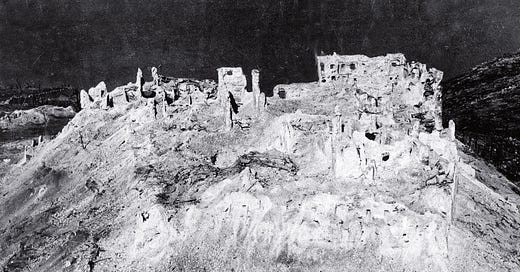This post follows on from readings in the Humanities Course provided by
I’ve been reading The Rule of Benedict by Saint Benedict of Nursia. The founder of the monastery at Monte Cassino in the sixth century. A beautiful monastery high on a hill. It was bombed out of existence in the second world war and rebuilt. A sign that from destruction, beauty can arise if we have humility and courage.
He knew that placing a group of men behind tall austere walls, rarely to see the world again, had the potential for trouble. Laying down a practical guide to conduct would help the monks live together harmoniously and keep their attention on God. He focussed on the principle areas to promote a healthy monastic community: humility, obedience, love, care of the sick, and silence. He also set out punishments: beatings, ostracisation and excommunication, just to keep everyone in line.
The offices (services) tightly stipulated the working of the monastery, times of the offices, meals, food, reading, leisure, devotion and contemplation. It stated the hierarchy within the community and the roles the monks would undertake and how those monks were to be chosen. The abbot was the head and God’s representative. His was the word of God.
There are seventy-three rules including the last that says to follow the rules, just in case a monk ever forgot. It is a short book, easily read in a few hours. Most rules take up a page or less. Most dealing with the mundane life in a closed community.
Take Rule Twenty-Five for Serious Offences: No one was allowed to speak to the transgressor. He was to work alone, eat alone, the food and meal time dictated by the abbot, no one was to offer any blessing. Some offences were never spoken of, so a monk only knew they had transgressed when they broke it, an education process based on first hand experience. Some offences would be punished with beatings followed by a nice chat with the abbot about how much God loved the beaten.
The longest guide is Rule Seven, Humility. Benedict knew that for everyone to get along and for God's creation to be sustainable there had to be respect for God, of each other and crucially of self. He broke the rule down into twelve steps, the first being honouring God at all times, the twelfth to display humility at all times.
It was the fifth step that registered with me. It says; [to have humility a monk must humbly confess to the abbot any wicked thoughts and wrongs he has secretly committed]. A confessional, a cleansing of the soul, keeping to the right path.
It caught my eye because it is reflected in the fifth step in the recovery programme of Alcoholics Anonymous which says; Admitted to God, to ourselves, and to another human being, the exact nature of our wrongs.
I have practised this fifth step many times, without knowing its progenitor. It is an important step on the road to recovery, one that can be severely punishing if not handled thoroughly. It follows the clearing out of the soul, writing down all the things that keep us awake at night, have us avoiding people and places and keep our heads looking down. In short, a life of fear.
This is what Benedict knew. No monk who was living in fear would be of use to God or the community. In fact he was a liability. Like the confessions of the monk, the sharing of my darkest moments with God, and another human being is designed to remove that fear, to deflate the ego and allow the seed of humility to see the light of a new day.
God can often be a stumbling block to many who seek recovery. The founders of AA suggest God or a power greater than myself. For many it is the group, or the programme or some focus of meditation.
The key to the step is sharing all the dirt and trash that sits at the bottom of my soul with another human being. This is where the rubber hits the mat, where, as AA says, the men are sorted from the boys. It is vital for long term sobriety.
There is little more daunting or ego deflating than sharing the stuff I would go to the grave with, with another human. It is someone I respect, that I have become friends with, whose family I have become close to. I am going to tell them about the drunkenness, the stealing, the hidden debt, the fights with partners, the sexual deviancies, the laws broken, the resentments held, the cruelty inflicted, the cowardice and grandiosity I live by.
I will sit there for many hours pulling out my entrails, occasionally looking up when I reach a cringing moment, to see the reaction of my confessor, hopefully there will be none. Nothing is to be left unsaid, nothing hidden, that is if I want the blessing of a good life ahead.
My confessor must be chosen wisely, a difficult task. It shows I have learned a little patience since attaining sobriety and some discernment. The confessor is usually my sponsor (mentor) who is guiding me through the twelve steps of the programme. I believe men for men and women for women. It was always the unspoken rule, but there are crossovers today. For me, I need someone who knows how a man of my type thinks and feels. Importantly I want to face my brothers, to see their reaction, to know I am still in the fold.
At the end of the sharing a confessor may well share some of their experience, some of their more embarrassing moments, to show the penitent they are not alone, that their confessor sees the whole person and not some one at a moment in time. Most of my transgressions will be trivial, some won’t. It is the fifth step that sets me on the path forward and leaves the old me behind. I am promised freedom from self, a growing humility and a life well-lived.
As sobriety continues and the years pass by, more things, forgotten, may come to mind. Or more usually that which was once acceptable I now see as unacceptable and I begin the tea making at three A. M. until I can stand it no more and seek out absolution by taking another fifth step. This is not a failing, more a sign that I and the programme are working as intended.
In time the steps will be welcomed, looked forward to because I know they will bring a harmonious life of peace and serenity. From the ruins I can build a beautiful life. The AA prayer on humility is an essential guide.
God grant me the serenity
To accept the things I cannot change
Courage to change the things I can
And the wisdom to know the difference.
Take care and good luck
Paul






Paul, I found myself overwhelmed by your post. Maybe because it arrived within minutes of an email from an old friend with increasingly severe dementia and in a hospital psychiatric ward seeking help I cannot give. I have yet to reply. At the moment I don’t know how to.
We all come with ‘baggage’ of sorts and the weight of it is enough to kill some. ‘Confessing’ is a two way street and having spent 12 years as a part-time sexual health counsellor, then 21 years providing (and developing) supported housing for tenants living with mental health challenges, I listened a lot and turned a blind eye to the pot being smoked by a good few. A few women turned to men they picked up wherever and whenever they could. If it didn’t kill them and gave them relief, then I ignored the rules which said they should have their tenancy ended.
I do not believe in the confessional. It seems a bit Catholic to me and I am so glad I avoided its tyranny, thanks to my mother not being married to my Catholic father. What I do believe in is each to their own and if what works for them does no harm to anyone else then who am I to judge? I thought writing this might help with my ‘lost’ friend. Right now it hasn’t, but Paul you do go deeper into yourself than I ever have! Take care. Robert 🐰
Again Paul, you have written a wonderful story. It resonates with, as I found recovery when I had my MH breakdown, I had to bare my soul to truly find myself. Once I had done that I could re build my life and mental health with the ruins it had left. I am at peace now, I do what I love, not as others would love me to do. I am constantly striving to improve myself, whether that be weight loss, fitness, professionally or as a dad, a husband or a friend.
Andrew Beavers told me about your books. You and your books saved me, they put me on this path, rekindling my boy hood love of the outdoor, adventure and learning something historical on a walk. I love them....
Thank you for your writing, your an amazing writer and your wonderfully gifted at it.
Long may it continue too.